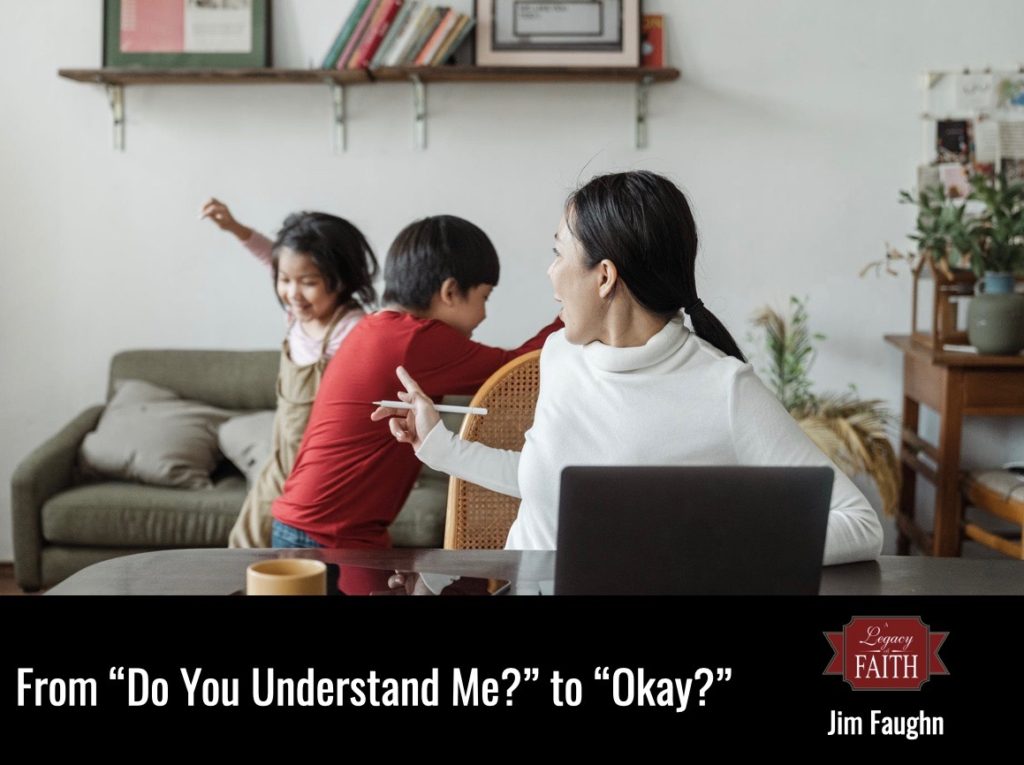From “Do You Understand Me?” to “Okay?”
I guess that I’m about to show my age, but I remember a time when parents, not the children, actually “called the shots” in families. I remember that, during that time, parents seemed to be less concerned about whether or not their children always liked them and more concerned about their children obeying them.
Apparently, those parents knew that there would be a time when their children would be “sent out into the world” and would find out that they were not actually the center of the universe. They might discover that there would be rules they would actually have to follow and that there might even be consequences if those rules were disobeyed.
While, thankfully, there are still parents like this, their numbers seem to be declining. The reason I think that is because of what I increasingly hear parents say to their children when something needs to be done, decided, or not done. Let me illustrate what I mean.
It used to be that parenting involved saying something to a child about a behavior that is expected, a decision that has already been made, or a number of other things. That would be followed by:
“Do you understand me?”
The tone of voice used and the question itself indicated very strongly that the question had nothing to do with whether or not the child agreed. The parent was only concerned with whether or not the message was received. It was a very clear statement about which person was in charge.
Increasingly (at least it seems to me), I hear statements that are somewhat similar, but, in other ways, totally different. The statements are still about behavior that is expected, a decision, or a lot of other things. However, what follows more and more today is:
“Okay?”
The tone of voice used in that statement all too often sends the message that the behavior, decision, etc. is subject to the agreement of the child. The message seems to be that, if it is not okay, everything can change. In fact, everything is open to negotiation. I would respectfully ask parents and others in authority for that matter to consider what we are setting children up for if that second and “thoroughly modern” style of parenting is employed.
Every parent has a hope that his or her children will grow into healthy, mature, and productive adults. Along the way they will run into people who probably won’t care much if something is okay with them or not.
For example, bosses have a way of expecting employees to actually show up to work and to do something while they are there. They really don’t care if it is okay with the employee or not.
Similarly, when a policeman orders us to pull our car to the side of the road, he/she doesn’t usually say, “if that’s okay.” Judges don’t have a habit of asking somebody facing time in jail or prison if that is okay. The government expects us to pay our taxes whether or not we like doing that or agree with it.
You can probably think of other examples, but these are enough for me to be able to state that, unless a child learns at an early age to respect authority at home, he/she and the parents may very well be in for a life of heartache.
In fact, the heartache could very well continue into eternity. My understanding of the judgment is that my eternal destiny will be announced and will be irrevocable whether it is okay with me or not.
It is just one person’s opinion. I freely acknowledge that. But this one person believes very strongly that individuals, families, churches, communities, and entire societies are blessed when people learn to respect and obey those in places of authority who are doing their best to look out for their best interests – whether it seems to be okay or not at the time.
To Receive Every Article from A Legacy of Faith through Email for Free, Click Here
AUTHOR: Jim Faughn



